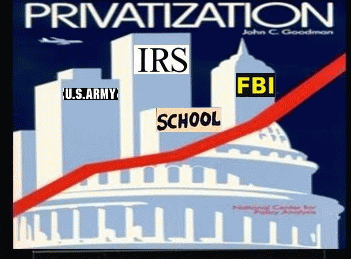(Article changed on October 19, 2012 at 09:41)
By Dave Lindorff

Local tax collection's being privatized. What next: the IRS?
(Image by ThisCantBeHappening) Details DMCA
I went into my local township building Monday to settle up my local income tax bill. I had filed for an extension of my federal and state taxes back in April because of my father's unexpected death a few weeks before the tax filing date and the need to deal with his funeral and with arranging for care for my widowed mother, who has alzheimers, had taken up all my time.
I paid my local tax bill on time though, because at 1 percent of income it is a relatively small amount and was easy to get out of the way. I just made a rough estimate and dropped a check with the one-page form in the mail, figuring I'd settle the amount due after my federal taxes were completed. So, after finally getting my federal and state taxes done, I went to the town hall to settle up. It turned out I'd overpaid my local taxes by $165.
Ordinarily if I've overpaid my local tax, for example by paying too much in the four required estimated tax payments, the township simply applies the overpayment to my next tax year's estimated payment. Not so this year. I was told that the collection of taxes by all the townships in Montgomery County had been privatized -- taken over by a private accountancy firm called Berkheimer Tax Administrator, a company expressly created to bid for outsourced collection operations of local towns, school districts and counties, for a fee.
The immediate problem for me resulting from this astonishing privatization of a fundamental local government activity -- the collection of taxes -- was that the local township office said they could not credit my overpayment as before. "Berkheimer is in charge of the money," a township official told me, "and they will send you a check for the overpayment."
"But that means I will be late in filing the first two quarterly estimated payments for 2012," I said, adding, "but I'm really not late, because they already have my money!"
"You'll have to call Berkheimer," she told me. "We can't do anything about it."
After calling Berkheimer (and waiting through 15 minutes of listening to god-awful Muzak), I finally got a tele-clerk, who told me that there was nothing she could do. I would be issued a check for the overpayment, and would be charged a late fee for my late quarterly payments. She said I could write and explain about my father's death and see if they could "do anything," but she didn't sound optimistic. I'm not either, and I sure don't want to go through any more of those 15-minute Muzak experiences (which seem calculated to deter callers)!
(Note: You can view every article as one long page if you sign up as an Advocate Member, or higher).





